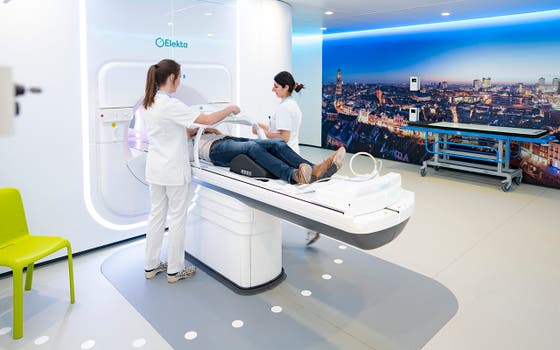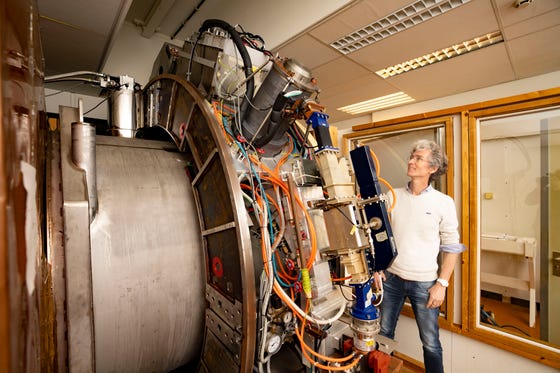New study speeds up radiation therapy

A targeted radiation therapy that lasts only 15 minutes, instead of 45 minutes. Plus: an even more precise, real-time treatment of the tumor. These are the two goals of a new study by UMC Utrecht to further innovate the MR-Linac. NWO has granted 1.7 million euros to this research project.
The MR-Linac is an invention of UMC Utrecht, which was co-developed with Elekta and Philips. It is an irradiation machine and MRI scanner in-one. The MR-Linac has brought about an enormous innovative acceleration in radiation treatment. It is a so-called 'non-invasive' therapy: it provides a more accurate and less burdensome alternative to conventional radiotherapy or surgery. By providing more targeted radiation in fewer sessions, the machine also helps to relieve some of the pressure on healthcare capacity. That is, the patient can go home faster, and doesn’t have to be admitted, unlike with surgery, so that less healthcare professionals are needed. During this new research project, the researchers will work on two technical adjustments to make the device even more patient-friendly, efficient and sustainable.
Shorter session
Thanks to the MR-Linac, radiotherapy has become more personalized because the radiation can be adapted to the location and size of the tumor in an individual patient during the actual treatment.
"But a MR-Linac session takes quite long: 45 to 60 minutes," says associate professor Martin Fast, who coordinates the new research project. "The MR-Linac treatment is three times longer than conventional radiotherapy, because there are more steps to go through. Having to lie still for 45 minutes can be quite uncomfortable for patients. It also increases the chances of unacceptable anatomical motion during treatment. Therefore, we would like to speed up every aspect of the process, streamlining the procedure for patients. By doing so, we will be able to treat more patients with the MR-Linac as well."
Martin is taking on this challenge with, among others, co-coordinator Bas Raaymakers. Bas is professor of experimental clinical physics at UMC Utrecht and one of the inventors of the MR-Linac.
Real-time treatment
In addition to speeding up the treatment time, the researchers also would like to address the frequency and quality of the so-called ‘treatment plan’. “At this time, treatment plans are adapted to the patient’s anatomy at the beginning of the procedure. MRI scans are made at the beginning of every MR-Linac session, resulting in the treatment plan (including the direction, dose, movement and time of the radiation – ed.) for that day. The treatment plan is then uploaded, and the MR-Linac's control system is ready to take over," Martin explains.
Of course, this is already much more precise than with conventional radiotherapy, because the scans have only just been made. But it's still not real-time. "And that's a shame, because a lot can change in 45 minutes. In the case of a lung tumor, for example, patients may suddenly adjust their breathing rhythm or pace when they relax or become more strained. Then, the location and movement of the tumor suddenly change, and newly adapted treatment plans based on new scans would be very useful," Martin says.
The researchers would like the treatment plan to be able to adapt continuously, in ‘real time’. "The MR-Linac should be able to update the treatment plan faster, more often and more precisely. We aim to make it standard for the system to respond to every physical movement on the spot," Martin says.
Teamwork
To further innovate the MR-Linac like this, a wide range of expertise is required. The researchers at UMC Utrecht have therefore joined forces with various private partners within the ART-PIVOT consortium. "Each partner has their own area of expertise. Computer scientists, physicists and radiation-oncologists, among others, work side by side. It's real teamwork."
The research project will last five years and will start this summer. Because medical and technical professionals work closely together on this project within a hospital environment, the ambition is to start treating patients with the updated MR-Linac technology relatively quickly.
"ART-PIVOT itself is not a clinical trial, but at UMC Utrecht we are experienced in introducing new image-guided interventions in daily hospital practice," says Martin. "In parallel with our project, the innovations will therefore be gradually introduced clinically as the technology matures. Of course, not from day one of our research, but about halfway through the project, we are anticipating. In any case, our goal is to have made the treatment time of 15 minutes standard in five years' time."
Within the ART-PIVOT consortium, UMC Utrecht has teamed up with AimValley, Elekta, Medscint and IBA Quasar. NWO (Netherlands Organisation for Scientific Research) has given the 1.6 million grant in the context of the Open Technology Programme via the NWO domain Applied and Engineering Sciences.
What is the MR-Linac?
During MR-Linac treatment, the radiation-oncologist can monitor the location and movement of the tumor using MRI scans. As a result, the cancer can be treated in a more targeted way. Also, the healthy surrounding tissue is less damaged than with conventional radiotherapy. Due to its precision, a higher dose of radiation can be administered per MR Linac session. As a result, only five instead of 20 radiation sessions are needed, in the case of prostate cancer.
UMC Utrecht professors Jan Lagendijk and Bas Raaymakers started developing the MR Linac in 1999. In 2018, it was introduced in daily hospital practice. The device is now used worldwide against prostate, rectum, pancreas, kidney, lung and gynecological tumors and metastases in the liver, adrenal gland and lymph nodes. Meanwhile, the number of tumor types that can be treated with the MR-Linac is increasing rapidly.

Bas Raaymakers with a prototype of the MR-Linac.
